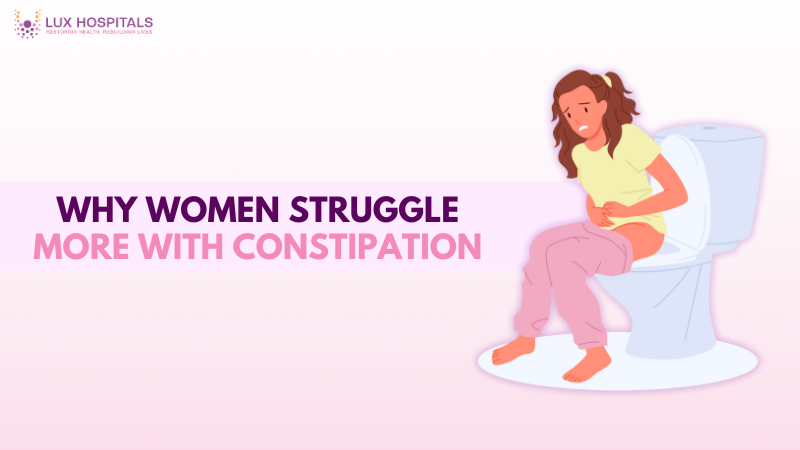Constipation in Women: Hormones and Digestion

Constipation in women is a common concern that affects millions around the world. While both men and women can suffer from digestive issues, research consistently shows that constipation in women is significantly more frequent. This difference is not just due to lifestyle but is deeply rooted in biological and hormonal factors. This blog will examine the reasons behind this—the gender gap emphasizing hormones, digestion, and helpful advice for enhancing intestinal health.
10 Causes of Constipation in Women and Tips to Fix Them
Constipation in women can be triggered by hormones, lifestyle, and health conditions. This section explores the top 10 causes and provides simple, practical tips to manage each one. Understanding these factors can help you take control of your digestive health.
1. The Role of Female Hormones
One primary reason for constipation in women is the influence of female sex hormones, especially progesterone and estrogen. These hormones vary during the menstrual cycle and can slow down bowel movements, especially in the luteal phase after ovulation. High progesterone levels relax intestinal muscles, which results in constipation and delayed digestion.
2. Menstrual Cycle and Bowel Patterns
Women often report changes in bowel habits during their menstrual cycle. Right before or during menstruation, many women experience constipation, which can later turn into diarrhea as hormone levels drop. These fluctuations in estrogen and progesterone directly impact intestinal motility and water absorption in the colon.
3. Pregnancy and Digestive Changes
Another time when women get constipation is during pregnancy. Bowel function is slowed by elevated progesterone and the strain of the expanding uterus on the intestines. By stiffening feces, iron supplements taken during pregnancy also exacerbate this issue.
4. Pelvic Floor Dysfunction
Many women suffer from pelvic floor disorders due to childbirth, ageing, or hormonal changes. Women who experience constipation may find it difficult to pass stools efficiently due to weakened or improperly coordinated pelvic muscles. Persistent constipation may further strain these muscles, resulting in a vicious cycle.
5. Menopause and Digestive Slowdown
Women’s constipation is made worse by the decrease in estrogen that occurs throughout menopause. Decreased hormone levels weaken pelvic muscles and decrease intestinal motility. Specific dietary and lifestyle measures are needed to maintain bowel regularity in the face of these changes.
6. Stress and Emotional Factors
Women are generally more susceptible to stress-related gastrointestinal disorders because of this; food and waste pass through a woman’s digestive tract more slowly, which increases water absorption and makes her stools more difficult. Women are particularly susceptible to chronic constipation because of this physiological imbalance.
7. Dietary Habits and Fiber Intake
Although fiber is crucial for healthy digestion, many women fail to consume the recommended amount. Low-fiber diets and inadequate water intake essentially cause women’s constipation. A diet high in fruits, vegetables, whole grains, and liquids can help reduce this issue.
8. Medications Commonly Used by Women
Certain medications often prescribed to women, such as antidepressants, calcium supplements, and iron pills, can cause constipation in women. These drugs reduce intestinal movement or alter stool consistency. Awareness and physician guidance are essential in managing medication-induced constipation.
9. Thyroid Disorders and Metabolism
More prevalent in women, hypothyroidism impairs gastrointestinal function and lowers metabolism. Women who have an underactive thyroid experience constipation as a result of decreased intestinal motility. These symptoms are frequently relieved by treating thyroid imbalance.
10. Irritable Bowel Syndrome with Constipation (IBS-C)
IBS-C is more frequently diagnosed in women than men. More prevalent in women, hypothyroidism impairs gastrointestinal function and lowers metabolism. Women who have an underactive thyroid experience constipation as a result of decreased intestinal motility. These symptoms are frequently relieved by treating thyroid imbalance.
Tips to Prevent and Relieve Constipation in Women
- Increase fiber intake: Aim for 25 grams daily from natural sources.
- Drink eight to ten glasses of water a day to stay hydrated.
- Engage in regular exercise: Even 30 minutes a day can improve digestion.
- Manage stress: Meditation, deep breathing, and counseling help reduce gut tension.
- Track hormonal cycles: Adjust diet and activity based on menstrual phases.
Conclusion
Understanding the biological and hormonal underpinnings of constipation is essential for efficient treatment and prevention in women. From menstruation to menopause, female bodies undergo cycles that directly affect digestion. By making mindful dietary and lifestyle choices and addressing underlying health issues, women can overcome this often frustrating condition and enjoy better digestive health.
Frequently Asked Questions
Because of changes in hormones, particularly those related to estrogen and progesterone, constipation is more common in women. These hormones impact the rate of intestinal muscle relaxation and digestion. Pregnancy, menopause, and pelvic floor dysfunction are further contributing causes.
Progesterone and estrogen significantly influence bowel movement in women. High levels of progesterone slow down intestinal motility, leading to constipation. Estrogen also impacts water absorption and bowel regulation during various life stages.
Hormone fluctuations during menstruation can result in either constipation or diarrhoea. Before a period, progesterone peaks and may cause slower digestion, resulting in constipation. As estrogen rises and progesterone falls, bowel activity may increase, reversing the effect.
Yes, pregnancy significantly increases the risk of constipation in women. Hormonal shifts and the expanding uterus's pressure slow down the digestive system. Prenatal vitamins, especially iron supplements, can further contribute to hard stools.
Stress is a significant trigger for constipation in women because it disrupts the brain-gut connection. Emotional strain slows down gut motility and increases sensitivity in the colon. Chronic stress can exacerbate existing gastrointestinal issues.
Yes, an underactive thyroid (hypothyroidism) is a known cause of constipation in women. It slows down metabolism, including digestive processes, resulting in hard stools and infrequent bowel movements. Proper thyroid management often resolves these symptoms.
Women should limit their processed foods, dairy, and low-fibre carbohydrate intake. These foods can contribute to sluggish digestion and harder stools. Replacing them with high-fiber, whole-food alternatives improves regularity.




















